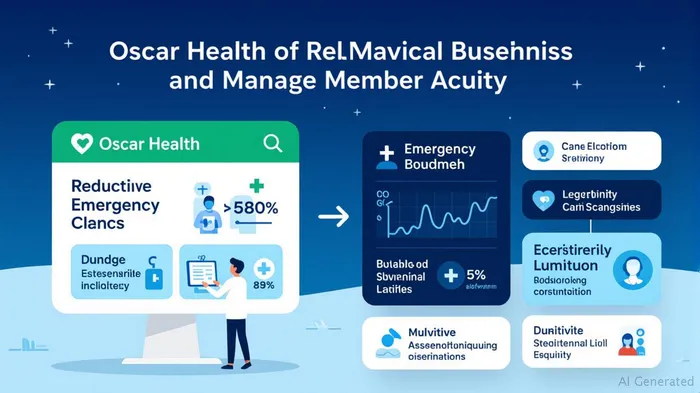Oscar Health: Can Tech-Driven Efficiency Outrun Regulatory Headwinds?
Oscar Health (OSCR) has faced significant headwinds in 2025, with analyst downgrades and a stock price decline of 37% from its 52-week high. At the core of the sell-off are concerns over regulatory uncertainty, rising medical costs, and the erosion of its pricing model due to a sicker membership base. Yet, the company retains unique advantages—operational efficiency, a tech-driven platform, and high-margin growth segments—that could position it for resilience. The question is whether these strengths outweigh the risks.
The Downgrade Storm: What's Driving the Skepticism?
Analysts at Wells FargoWFC-- and BarclaysBCS-- downgraded Oscar to “Underweight” in Q2 2025, citing two primary issues:
1. Regulatory Uncertainty: The expiration of ACA enhanced subsidies and the uncertain fate of Cost-Sharing Reduction (CSR) funding threaten Oscar's member base and margins. If CSR is stripped from legislation, up to 34% of its members (those in bronze-tier plans) could lose subsidies, destabilizing enrollment.
2. Pricing Model Strain: “Exchange acuity”—a trend of sicker individuals enrolling in ACA plans—has pushed Oscar's Medical Loss Ratio (MLR) to 75.4%, up 120 basis points from 2024. Wells Fargo argues this could outpace premium growth, squeezing profitability.
Even after Oscar reported a Q2 earnings beat (EPS of $0.92 vs. $0.81 estimates), its shares fell 9.4%, underscoring investor skepticism about its ability to navigate these challenges.
Regulatory Risks: A Triple Threat
- Subsidy Sunset: The loss of ACA subsidies in 2025 could force higher premiums for lower-income enrollees, risking attrition. Barclays estimates this could slice Oscar's 2027 EPS by 30 cents.
- CSR Funding Fight: The Senate has already removed CSR from its budget reconciliation bill, while the House retains it. If CSR is eliminated, bronze-tier members—who account for 34% of Oscar's ACA enrollment—would lose subsidies, worsening risk pools.
- CMS Program Integrity: New enrollment rules could reduce consumer choice, threatening Oscar's high-margin ICHRA segment (15% of membership, 20% of revenue).
Pricing Pressures: AcuityAYI-- and Cost Inflation
- Rising Acuity: Sicker populations in ACA markets are pushing medical cost inflation higher than insurers' pricing assumptions. Wakely Consulting estimates ACA markets are now growing 10% annually in costs—faster than pre-pandemic trends.
- Risk-Adjustment Risks: Centene's withdrawal of 2025 guidance due to inaccurate risk-adjustment accruals has raised concerns about Oscar's similar exposure. JefferiesJEF-- estimates Oscar may face $880M in additional risk-adjustment payables in 2025.
Why Oscar Might Still Win: Operational and Structural Advantages
- Tech-Driven Efficiency:
- Oscar's AI platform and virtual care tools have kept its MLR 2–3% below industry averages. Its Q1 2025 SG&A expense ratio hit 15.8%, a record low.
- ICHRA Growth Engine:
- ICHRA membership grew 50% annually, offering higher margins and regulatory stability. This segment now accounts for 20% of revenue, a cushion against ACA volatility.
- Capital Reserves:
- $1.8B in statutory capital and $774M in excess risk-based capital provide a buffer against MLR swings.
The Bottom Line: A High-Risk, High-Reward Play
Oscar's stock trades at a P/S ratio of 1.1x—below peers like ElevanceELV-- (1.5x)—and its forward P/E of 34.6 reflects high expectations for margin recovery. Bulls argue its tech edge and ICHRA momentum justify a “Buy,” while bears cite regulatory and acuity risks.
Key Catalysts to Watch:
- Q3 2025 Risk-Adjustment Data: Will clarify accrual accuracy and MLR stability.
- ACA Enrollment Figures: Post-subsidy changes, enrollment trends will signal member retention strength.
- Legislative Outcomes: Medicare Part E's potential passage (a $200B market) or CSR resolution could swing the stock.
Investment Takeaway
Oscar Health is a stock for long-term investors willing to bet on its ability to navigate regulatory turbulence. Its tech-driven efficiency and ICHRA growth offer resilience, but near-term risks—particularly around acuity and policy—demand caution. For now, the dip to $15.53 creates a margin of safety, but execution on margin expansion and regulatory adaptation will be critical.
In a sector where operational excellence is the key to survival, Oscar's tech edge and discipline give it an edge—but the path forward remains fraught with uncertainty.
Delivering real-time insights and analysis on emerging financial trends and market movements.
Latest Articles
Stay ahead of the market.
Get curated U.S. market news, insights and key dates delivered to your inbox.


Comments
No comments yet